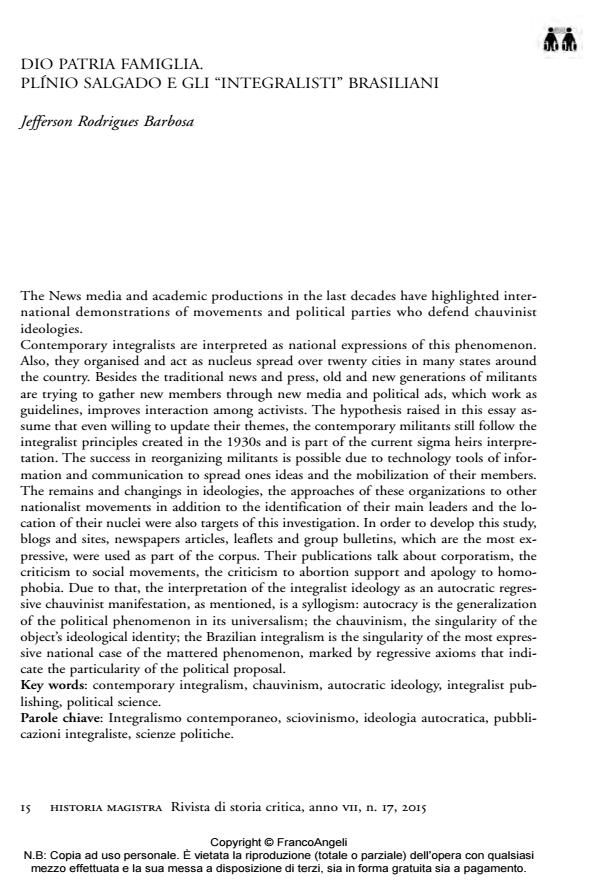Dio patria famiglia. Plínio salgado e gli "integralisti" brasiliani
Titolo Rivista HISTORIA MAGISTRA
Autori/Curatori Barbosa Jefferson Rodrigues
Anno di pubblicazione 2015 Fascicolo 2015/17 Lingua Italiano
Numero pagine 15 P. 15-29 Dimensione file 161 KB
DOI 10.3280/HM2015-017003
Il DOI è il codice a barre della proprietà intellettuale: per saperne di più
clicca qui
Qui sotto puoi vedere in anteprima la prima pagina di questo articolo.
Se questo articolo ti interessa, lo puoi acquistare (e scaricare in formato pdf) seguendo le facili indicazioni per acquistare il download credit. Acquista Download Credits per scaricare questo Articolo in formato PDF

FrancoAngeli è membro della Publishers International Linking Association, Inc (PILA)associazione indipendente e non profit per facilitare (attraverso i servizi tecnologici implementati da CrossRef.org) l’accesso degli studiosi ai contenuti digitali nelle pubblicazioni professionali e scientifiche
The News media and academic productions in the last decades have highlighted international demonstrations of movements and political parties who defend chauvinist ideologies. Contemporary integralists are interpreted as national expressions of this phenomenon. Also, they organised and act as nucleus spread over twenty cities in many states around the country. Besides the traditional news and press, old and new generations of militants are trying to gather new members through new media and political ads, which work as guidelines, improves interaction among activists. The hypothesis raised in this essay assume that even willing to update their themes, the contemporary militants still follow the integralist principles created in the 1930s and is part of the current sigma heirs interpretation. The success in reorganizing militants is possible due to technology tools of information and communication to spread ones ideas and the mobilization of their members. The remains and changings in ideologies, the approaches of these organizations to other nationalist movements in addition to the identification of their main leaders and the location of their nuclei were also targets of this investigation. In order to develop this study, blogs and sites, newspapers articles, leaflets and group bulletins, which are the most expressive, were used as part of the corpus. Their publications talk about corporatism, the criticism to social movements, the criticism to abortion support and apology to homophobia. Due to that, the interpretation of the integralist ideology as an autocratic regressive chauvinist manifestation, as mentioned, is a syllogism: autocracy is the generalization of the political phenomenon in its universalism; the chauvinism, the singularity of the object’s ideological identity; the Brazilian integralism is the singularity of the most expressive national case of the mattered phenomenon, marked by regressive axioms that indicate the particularity of the political proposal. Key words: contemporary integralism, chauvinism, autocratic ideology, integralist publishing, political science.;
Keywords:Integralismo contemporaneo, sciovinismo, ideologia autocratica, pubblicazioni integraliste, scienze politiche
Barbosa Jefferson Rodrigues, Dio patria famiglia. Plínio salgado e gli "integralisti" brasiliani in "HISTORIA MAGISTRA" 17/2015, pp 15-29, DOI: 10.3280/HM2015-017003